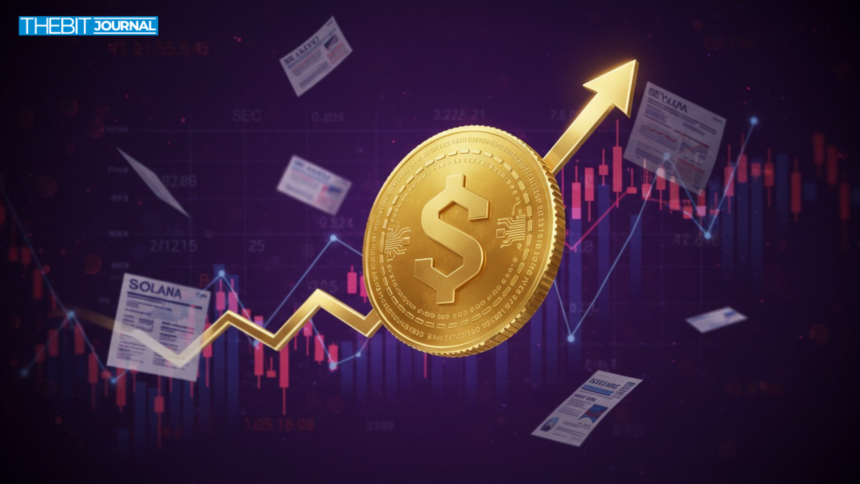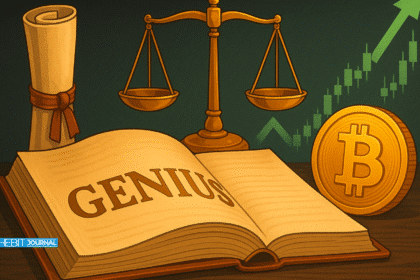The U.S. Securities and Exchange Commission (SEC) now officially processes spot Solana (SOL) ETFs through asset manager applications. Asset managers, including Canary, VanEck, Bitwise, and 21Shares, filed their submissions to the SEC. After accepting these filings, the SEC begins its approval process for Spot Solana exchange-traded funds.
According to its official acknowledgment status, Solana receives rising institutional interest, although approval remains uncertain. These ETFs met the SEC requirements to enable investors to invest in Solana by getting indirect Solana exposure upon approval. Expert market analysts identify this development as an important achievement in blockchain technology adoption through institutional investments.
The regulated Spot ETF investment method allows investors to buy into crypto assets. The approval of Bitcoin spot ETFs created an important roadmap for similar fund creations involving alternative cryptocurrencies. Solana’s increasing acceptance and its reliable network operations make it a strong contender for receiving ETF approval.
SEC’s Review Process and Market Implications
After their official acknowledgment, the SEC will now start reviewing applications for Solana ETFs. Under the regulatory framework, asset review determines an asset’s compliance status with security or commodity determinations. Bitcoin spot ETFs received SEC approval earlier, which strengthens predictions that Solana will secure similar authorization.

Professional investors are closely following the SEC’s actions. If Solana gets approval from the SEC, it will gain more liquidity, defined rules, and broader access to the market. The approval system remains complicated even though it does not ensure regulator approval.
The SEC maintains an apprehensive position toward cryptocurrency ETFs because of their operational instability and protection vulnerabilities. The increasing demand for crypto investment products possibly affects the SEC’s decision-making process. The market anticipates more regulatory actions that need to be implemented before final approval can be given.
Solana ETF Could Set New Market Trend
Solana ETF recognition has brought great enthusiasm to the crypto community. Mainstream adoption receives a positive boost from investors because of this development. Multiple market experts foresee Solana’s demand would increase if its authorization materializes.
Professional market analysts consider the approval process an indication that Solana presents robust investment possibilities. This development presents a significant chance for institutional participation in the market. Asset managers have shown quick reactions to Solana because they see it as holding strong prospects for the long run.

The SEC’s fast response to crypto ETFs indicates developing attitudes toward accepting such financial instruments. Bitcoin ETFs became successful, encouraging the approval of other digital assets. Approval for Solana ETFs would allow other blockchain projects to gain acceptance.
Potential Impact on Solana’s Value
A spot Solana ETF approval will generate substantial market value changes to SOL. ETF approvals create strong price increases within underlying assets repeatedly. Hundreds of billions flowed into Bitcoin’s price because of its spot exchange-traded fund authorization.
Solana is today an important blockchain platform that delivers fast operations along with minimal transaction costs. Implementing an ETF would allow institutional investors to reach SOL more easily, boosting market demand. Solana’s value may advance to better heights as its adoption grows and its liquidity expands.
External economic conditions may impact Solana’s price movement behavior. Market forces, along with interest rate choices, can redirect investment money streams. Several other variables besides ETF approval will influence SOL’s price movement in the future.
Solana’s Classification May Impact ETF Decision
Solana ETF approval faces ongoing regulatory challenges despite a generally positive outlook. The SEC maintains an unclear position regarding whether to recognize cryptocurrencies as securities. Bitcoin’s regulatory status as a commodity stands approved, although Solana needs to pass further regulatory examinations.
Regulatory organizations have studied blockchain projects in the past to examine decentralization characteristics and compliance metrics. ETF approval may become more challenging if the SEC determines Solana fits under the definition of security status. Solana’s regulatory future depends heavily on the predicted Ethereum status decisions.
The ultimate decision made by the SEC will shape future developments in the crypto market globally. The SEC approval would demonstrate increased market acceptance of blockchain-based economic products. Such rejection may cause institutional delays while also affecting market sentiment.
Conclusion
Receiving spot Solana ETF filings from the SEC represents a crucial development toward the institutional adoption of Solana. The reception provides evidence that institutions need regulated cryptocurrency investment products despite no clear approval standing ahead. Numerous investors and analysts maintain intensive observation as the SEC conducts its decision-making evaluations throughout the upcoming months.
The approval of Solana ETFs will result in substantial capital entries into the ecosystem. Financial institutions investing in Solana will build its market standing and gain credibility. This acknowledgment validates Solana’s expanding role in the crypto world regardless of whether it receives approval or not.
FAQs
What does the SEC’s acknowledgment mean for Solana ETFs?
The acknowledgment means the SEC has formally started reviewing the ETF filings but does not guarantee approval.
Why is an ETF important for Solana?
An ETF would provide a regulated investment option for institutions and increase market liquidity for Solana.
How does this compare to Bitcoin ETFs?
Bitcoin ETFs received approval based on their classification as commodities, but Solana may face different regulatory scrutiny.
Will Solana’s price increase if the ETF is approved?
Historically, ETF approvals have led to price increases, but other market factors will also influence Solana’s price.
What challenges does Solana face in the approval process?
Regulatory classification and compliance risks are major challenges, as the SEC may consider Solana a security instead of a commodity.
Glossary
Exchange-Traded Fund: Is a basket of stocks and bonds that trades on an exchange like a stock.
Solana ETF: A Solana ETF allows investors to access SOL, Solana’s native cryptocurrency, without requiring direct purchase or management.
Institutional Investors: Large financial entities such as banks, hedge funds, and asset managers.
Liquidity: The ability of an asset to be quickly bought or sold without significant price fluctuations.
Macroeconomic Factors: A macroeconomic factor is a broad economic trend or condition that affects the overall economy rather than a specific group.





























